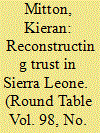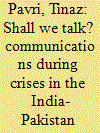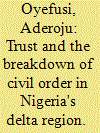| Srl | Item |
| 1 |
ID:
089414


|
|
|
|
|
| Publication |
2009.
|
| Summary/Abstract |
Bangladesh's parliamentary elections in December 2008 witnessed a landslide victory for an alliance led by Sheikh Hasina's Awami League following two years of a caretaker government backed by the military. The country's beleaguered population faced the twin challenges of natural disasters and pervasive poverty. One of the key factors influencing trust in the government of Bangladesh is stability, which has been in short supply because of confrontational politics between the two largest parties and accompanying violence. This paper considers efforts to rebuild trust by examining the work of a social movement, Transparency International Bangladesh (TIB), at two levels: strengthening the pillars of the national integrity system (with a specific focus on parliament), and holding public bodies to account for corrupt practice in delivering key services. People's experiences of services delivered through schools, hospitals and local government have resulted in a complete collapse in trust in public bodies. The commitment of the democratically elected government to tackle corruption at all levels will be a key determinant of whether trust and stability can emerge from the volatility of Bangladesh's politics.
|
|
|
|
|
|
|
|
|
|
|
|
|
|
|
|
| 2 |
ID:
089412


|
|
|
|
|
| Publication |
2009.
|
| Summary/Abstract |
This article uses the controversial November 2008 Belfast homecoming parade of local men and women in the British armed services as a case study to examine the mechanisms at work picking away at inter-communal trust, and the speed and persistence of their application, a defining characteristic of these mechanisms. The article conceptualises trust partially by reference to social capital, and closely examines how issues of post-conflict memory and contested space intersected and damaged nascent networks of inter-community trust. The article will also tentatively suggest means by which such cultural conflicts can be allowed to combust without ripping away grassroots trust and threatening civil disorder.
|
|
|
|
|
|
|
|
|
|
|
|
|
|
|
|
| 3 |
ID:
089416


|
|
|
|
|
| Publication |
2009.
|
| Summary/Abstract |
In 2004, Sierra Leone's Truth and Reconciliation Commission reported that building public trust in Sierra Leone's post-conflict government and political system was a precondition for development in all sectors of society. This article assesses progress in this venture, and finds that problems of deep distrust continue to pervade all levels of socio-political interaction in Sierra Leone. Nevertheless, the manner in which political trust is conceptualised in Sierra Leone is changing as traditional inequitable systems of patronage are gradually rejected. Noting this trend, it is a central argument of this article that the channelling of prevailing political cynicism into mechanisms of accountability, combined with the earning of public trust by exemplary political leaders, represents the most effective way to reconstruct trust in government, the political system, and throughout Sierra Leone in general.
|
|
|
|
|
|
|
|
|
|
|
|
|
|
|
|
| 4 |
ID:
089418


|
|
|
|
|
| Publication |
2009.
|
| Summary/Abstract |
This article examines selected crises that have arisen between India and Pakistan in the post-independence period and asks if communications between the two sides, whether direct or indirect, have made a difference in whether the crisis has escalated to war or been settled short of it. It finds that both kinds of communication have succeeded in building trust during escalating crises and that this may have led to settlements short of war. It also suggests that the content of communication is important and that positive messages sent through either channel have led to successful outcomes. It calls for the maintenance of sustained and dedicated communication channels that will remain in place and continue to build trust after crises are settled, rather than the ad hoc ways in which the two countries have communicated during crises thus far.
|
|
|
|
|
|
|
|
|
|
|
|
|
|
|
|
| 5 |
ID:
089419


|
|
|
|
|
| Publication |
2009.
|
| Summary/Abstract |
This article examines the concept of trust in the context of resource extraction, focusing on the moral and statutory responsibilities of the state, extractive firms, and host communities, and using Nigeria's Niger Delta as a case study. It attributes ongoing oil-related unrest to the breakdown of trust between these parties. Using a combination of primary and secondary data, it links outbreaks of violence to the failure of the state to foster development, create an enabling environment for economic growth in communities, and build rational institutions for peaceful and sustainable resource extraction; oil companies' exploitation of weaknesses in existing institutional arrangements to promote selfish interests; communities' almost-total dependence on companies for the provision of public goods and employment; and the collapse of trust between communities and between various groups and individuals in the region. To address conflict outbreaks, restore and build trust between parties, it recommends some institutional reforms and policy changes in the oil industry and beyond.
|
|
|
|
|
|
|
|
|
|
|
|
|
|
|
|
| 6 |
ID:
089413


|
|
|
|
|
| Publication |
2009.
|
| Summary/Abstract |
In May 2008 South Africans made international headlines by embarking on a hitherto unprecedented campaign of violence against African migrants. This violence formed part of a wider pattern of intolerance and antagonism against African migrants in post-Apartheid South Africa. At the heart of this prejudice lies socio-economic deprivation, whilst the political context within which the attacks took place could explain its timing. Much of the work on South African xenophobia takes a citizenship approach, examining processes of nationhood, or focuses on post-Apartheid immigration policy. This paper contributes to the study of xenophobia in South Africa by analysing it in relation to social capital, which emphasises trust as crucial for social development. This article asks what xenophobia suggests about levels of trust in South Africa and argues that the events of May 2008 exposed the distrust-particularly amongst black Africans-that permeates post-Apartheid society. It starts by charting the recent development and causes of xenophobia in South Africa, its significance for trust and social capital, and finally proposes strategies for increasing trust between groups in the context of xenophobia.
|
|
|
|
|
|
|
|
|
|
|
|
|
|
|
|